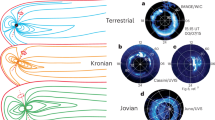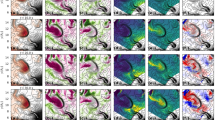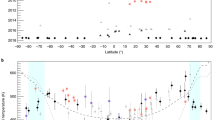Abstract
KUPFERBERG1 first, and later on Rathgeber2, have both directed attention to the possibility that the latitude effect of cosmic rays due to the geomagnetic field may be partially masked by the fact that the height of the pressure-level of meson formation increases towards the equator. In particular, Rathgeber has shown, by taking 100 mb. for this pressure-level, that owing to this increase, the intensity of mesons at sea-level at mean latitudes should exceed the intensity at the equator by 3 per cent. The magnetic latitude effect would therefore be reduced from 10 to 7 per cent.
This is a preview of subscription content, access via your institution
Access options
Subscribe to this journal
Receive 51 print issues and online access
$199.00 per year
only $3.90 per issue
Buy this article
- Purchase on Springer Link
- Instant access to full article PDF
Prices may be subject to local taxes which are calculated during checkout
Similar content being viewed by others
References
Kupferberg, K. M., Phys. Rev., 73, 804 ( 1948).
Rathgeber, H. D., Nature, 162, 303 ( 1948).
Haurwitz and Austin, "Climatology", 36 ( 1944).
Duperier, A., Proc. Phys. Soc., 61, 34 ( 1948).
Author information
Authors and Affiliations
Rights and permissions
About this article
Cite this article
DUPERIER, A. Latitude Effect and Pressure-Level of Meson Formation. Nature 163, 369–370 (1949). https://doi.org/10.1038/163369a0
Issue Date:
DOI: https://doi.org/10.1038/163369a0
Comments
By submitting a comment you agree to abide by our Terms and Community Guidelines. If you find something abusive or that does not comply with our terms or guidelines please flag it as inappropriate.



